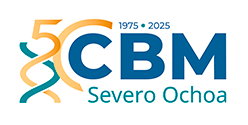Scientific Program
Physiological and pathological processes
RESEARCH GROUP
Neuronal repair and molecular therapy in neurodegeneration: spinocerebellar ataxias

Javier Diaz-Nido
Our group focuses on the study of a type of neurodegenerative disease, ataxias, which are characterized by the loss of neurons in the cerebellum and spinal cord. In particular, we have focused on Friedreich’s ataxia, which is the most common hereditary ataxia in Europe. We are trying to clarify the molecular basis of this pathology and develop therapies that may be effective for its treatment.

Research
Friedreich’s ataxia is a neurogenetic, autosomal recessive disease caused by a deficiency of frataxin, a protein located mainly in mitochondria. In addition to the neurodegenerative component, many patients also suffer from musculoskeletal disorders, hypertrophic cardiomyopathy and diabetes. Friedreich’s ataxia is a degenerative disease with a very early onset, and can serve as a very useful model for other degenerative diseases in which mitochondrial dysfunction also plays a very important role.
In the context of Friedreich’s ataxia, we have developed different neural cell models to study the molecular mechanisms of the neurodegenerative process triggered by frataxin deficiency. These studies have allowed us to identify processes such as iron-sulfur centre deficiency, a decrease in some mitochondrial respiratory chain complexes, the generation of reactive oxygen species, increased DNA damage, activation of the p53 protein, and activation of apoptosis as crucial elements in neurodegeneration. In addition, we have demonstrated an additional, very important role of astrocyte activation that contributes to the neurodegenerative process through neuroinflammatory and neurotoxic processes.
Furthermore, we are also using our cellular models to test possible therapeutic strategies with an emphasis on finding molecules (drugs or genes) capable of compensating for the functional deficits induced by frataxin deficiency or capable of efficiently increasing frataxin expression. In particular, we are paying special attention to neurotrophic factors and drugs capable of stimulating the production and/or signalling of these factors. Our group has been the first to discover that brain-derived neurotrophic factor (BDNF) has the ability to inhibit neurodegeneration induced by frataxin deficiency. We have also found that SAG, an agonist of the SHH pathway, decreases the activation of frataxin-deficient astrocytes and the secretion of proinflammatory cytokines.
Our group has also been a pioneer in the development of gene therapy strategies for Friedreich’s ataxia by introducing correct copies of the frataxin gene through the administration of herpesviral vectors carrying the cDNA or the complete genomic “locus” of frataxin.
Currently our group is focused on the characterization of neurodegeneration in the cerebellum of a new mouse model of Friedreich’s ataxia. This mouse model will also be very useful for testing possible therapeutic strategies.
In collaboration with the group of Dr. Tiago Fernandes and Dr. Joaquim Cabral, from the Institute of Bioengineering of the University of Lisbon, we are also exploring the generation of human cerebellar organoids as a new experimental model of Friedreich’s ataxia. For this purpose we are using iPS cells derived from fibroblast biopsies from healthy subjects and patients with Friedreich’s ataxia.
In the area of transfer, our group has had research contracts with the biopharmaceutical company Minoryx evaluating possible drugs in our Friedreich’s ataxia models.
Our group also collaborates with the Federation of Ataxias of Spain (FEDAES) by disseminating advances in research among patients and family members.
In addition to our research activity, we are strongly committed to improving and innovating the teaching/learning of Biomedicine, the dissemination of advances in biomedical research and its bioethical and social implications.
Javier Diaz-Nido teaches mainly in the Bachelor’s Degree in Biochemistry and the Master’s Degree in Molecular Biomedicine at the Autonomous University of Madrid. He is also a member of the Institute of Human Rights, Democracy, Culture of Peace and Non-Violence (DEMOS-PAZ) of the same university.
Group members

Javier Díaz Nido
Lab.: 207 Ext.: 4562
javier.diaznido(at)cbm.csic.es

Francisco José Fernández Galeote
Lab.: 207 Ext.: 4562
Selected publications

The smoothened agonist SAG reduces mitochondrial dysfunction and neurotoxicity of frataxin-deficient astrocytes
Andrés Vicente-Acosta et al.
Title
Authors

Gene Transfer of Brain-derived Neurotrophic Factor (BDNF) Prevents Neurodegeneration Triggered by FXN Deficiency
Yurika Katsu-Jiménez et al.

Delivery of the 135 kb human frataxin genomic DNA locus gives rise to different frataxin isoforms
S. Pérez-Luz et al.




